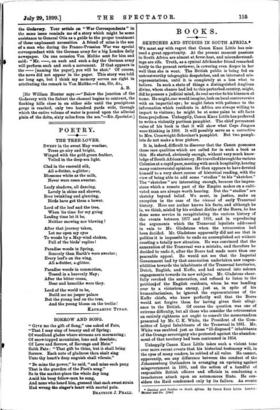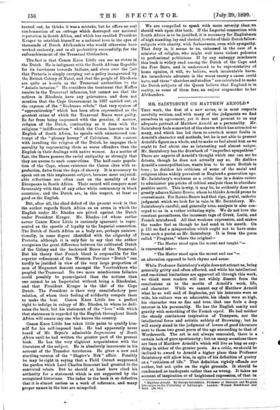BOOKS.
SKETCHES AND STUDIES IN SOUTH AFRICA.* WE must say with regret that Canon Knox Little has mis- used a great opportunity. At the present moment passions in South Africa are almost at fever-heat, and misunderstand- ings are rife. Truth, as a cynical Afrikander friend remarked lately to the present reviewer, is cowering even deeper in her well than she is wont. The British public is being fed on untrustworthy telegraphic despatches, and on interested mis- representations, until it is completely at a lose what to believe. In such a state of things a distinguished Anglican divine, whom chance had led to this perturbed country, might, did he possess a judicial mind, do real service to his kinsmen at home. He might, one would imagine, look on local controversies with an impartial eye ; he might listen with patience to the information which residents in Africa are always willing to impart to visitors ; he might be at some pains to sift facts from prejudices. Unhappily, Canon Knox Little has preferred to write a violently partisan pamphlet. The chief permanent value of his book is that it will show what Cape Jingoes were thinking in 1898. It will possibly serve as a corrective to Mrs. Cronwright-Schreiner's pamphlet. But two pamph- lets do not make a true picture.
It is, indeed, difficult to discover that the Canon possesses those rare qualities which are called for in such a book as this. He started, obviously enough, without very much know- ledge of South African history. He travelledthrough the various Colonies at a rapid pace, meeting with much hospitality, hearing many controversial opinions. He then appears to have devoted himself to a very short course of historical reading, with the view of being able to add some "studies " to his "sketches." The " sketches " are interesting enough, because the impres- sions which a remote part of the Empire makes on a culti- vated man are always worth hearing. But the " studies " are sketchy beyond belief. We must, in justice, make an exception in the case of the resume of early Transvaal history. Here our author knows his facts, and although he is, we think, misled by his evident dislike of the Boers, he has done some service in recapitulating the curious history of the events between 1877 and 1881, and in reproducing the arguments which the Transvaal loyalists addressed in vain to Mr. Gladstone when the retrocession had been decided. Mr. Gladstone apparently did not see that in politics it is impossible to undo an accomplished act without creating a totally new situation. He was convinced that the annexation of the Transvaal was a mistake, and therefore he decided to undo it, after the Boers had made more than one peaceable appeal. He would not see that the Imperial Government had by that annexation undertaken new respon- sibilities towards the inhabitants of the Transvaal territories, Dutch, English, and Kaffir, and had entered into solemn engagements towards its new subjects. Mr. Gladstone cheer- fully revoked the annexation, and refused to listen to the petition' of the English residents, whom he was handing over to a victorious enemy, just as, in spite of his humanitarianism, he ignored the representations of the Kaffir chiefs, who knew perfectly well that the Boers would not forgive them for having given their allegi- ance to the British. Of course the question was one of extreme difficulty, but all those who consider the retrocession an entirely righteous act ought to consult the memorandum presented by Mr. C. K. White, the President of the Com- mittee of Loyal Inhabitants of the Transvaal in 1881. Mr. White was snubbed just as those "ill-disposed" inhabitants of the Orange sovereignty who protested against the abandon- ment of that territory bad been contemned in 1854.
Unhappily Canon Knox Little takes such a violent tone over more recent events that his historical testimony will, in the eyes of many readers, be robbed of all value. He cannot, apparently, see any difference between the conduct of the Johannesburg Outlanders in arranging an uprising against misgovernment in 1895, and the action of a handful of responsible British officers and officials in conducting a treacherous attack upon an autonomous State. He con- siders the Raid condemned only by its failure. As events
• Sketches and Studies in South Africa. By Canon Knox Little. London Abister and Co. (1€4]
turned out, he thinks it was a mistake, but he offers no real condemnation of an outrage which destroyed our national reputation in South Africa, and which has enabled President Kruger to establish himself as a national hero in the eyes of thousands of Dutch Afrikanders who would otherwise have worked zealously, and in all probability successfully, for the enfranchisement of the Transvaal Outlanders.
The fact is that Canon Knox Little can see no virtue in the Dutch. He is indignant with the South African Republic for its harshness towards Indians, and slurs over the Cact that Pretoria is simply carrying out a policy inaugurated by the British Colony of Natal, and that the people of Rhodesia are quite as hostile as the Transvaal authorities to the Asiatic invasion." He considers the treatment that Baffles receive in the Transvaal infamous, but cannot see that the natives in Rhodesia have any grievances, and does not mention that the Cape Government in 1897 carried out, at the expense of the " Bechnana rebels," that very system of " apprenticeship " which has been often represented as the greatest crime of which the Transvaal Boers were guilty. So far from being impressed with the genuine, if narrow, religion of the Dutch, contrasting as it does with the religious "indifferentism " which the Canon laments in the English of South Africa, he speaks with unmeasured con- tempt of the "gloomy heresy" of Calvinism. Not content with insulting the religion of the Dutch, be impugns their morality by representing them as worse offenders than the English in their dealings with native women. As a matter of fact, the Boers possess the racial antipathy so strongly that they are averse to each connections. The half-caste popula- tion of the Cape, whose existence the Canon cites with re- probation, dates from the days of slavery. It is necessary to speak out on this unpleasant subject, because moat unjustifi- able reflections are often cast on the morality of the Europeans in South Africa. Their record will compare most favourably with that of any other white community in black countries ; and the Dutch are, in this respect, at least as good as the English.
But, after all, the chief defect of the present work is that the author regards South Africa as an arena in which the English under Mr. Rhodes are pitted against the Dutch under President Kruger. Mr. Rhodes (of whose earlier career Canon Knox Little is curiously ignorant) is repre- sented as the apostle of loyalty to the Imperial connection. The Dutch of South Africa as a body are, perhaps uninten- tionally, in some degree identified with the oligarchy of Pretoria, although it is only fair to say that the author recognises the great difference between the cultivated Dutch of the Colony and the backward Boers of the Transvaal. But his theory that French blood is responsible for the superior refinement of the Western Province "Dutch" can hardly be justified in view of the very large proportion of men of Huguenot descent amongst the Voortrekkers who peopled the Transvaal. No two more mischievous fallacies could possibly be promulgated than the notions than one cannot be an Imperialist without being a Rhodesian, and that President Kruger is the idol of the Cape Dutch. The President is their very unsatisfactory poor relation, of whom their feeling of solidarity compels them to make the best. Canon Knox Little has a perfect right to indulge in eulogy of Mr. Rhodes, to whom he dedi- cates the book, but his statement of the "love " with which that statesman is regarded by the English throughout South Africa will amaze any one who knows the country.
Canon Knox Little has taken little pains to qualify him- self for his self-imposed task. He had apparently never heard of Mr. Bryce's admirable Impressions of South Africa until he had written the greater part of the present book. He has the very slightest acquaintance with the literature of the subject. He is absolutely inaccurate in his account of the Transkei territories. He gives a new and startling version of the " Slagter's Nek" affair. Possibly be may be right in saying that a Field Cornet suppressed the pardon which Lord Charles Somerset had granted to the convicted rebels. Bnt he should at least have cited his authority for a statement which is not supported by the recognised historians. The index to the book is so defective that it is almost useless as a work of reference, and many proper names in the text are misspelled. We are compelled to speak with more severity than,we should wish upon this book. If the Imperial connection with South Africa is to be justified, it is necessary for Englishmen of high standing, lay and clerical, to write of their Dutch fellow- subjects with charity, with forbearance, eves with sympathy. That duty is, it seems to ns, enhanced in the case of a minister of religion, who might well leave violent polemics to professional politicians. If by any unhappy mischance this book is widely read among the Dutch of the Cape and the Free State, and is understood to be representative of home opinion, it will, we believe, work incalculable harm. An immoderate advocate is the worst enemy a cause could have, and these " sketches and studies " are calculated to make the Dutch subjects of the Queen believe that England is in reality, as some of them fear, an unjust stepmother to her Afrikanders.



































 Previous page
Previous page